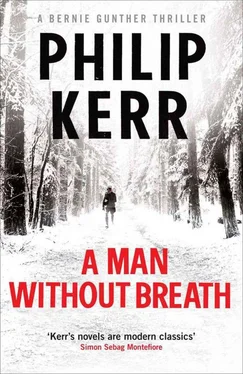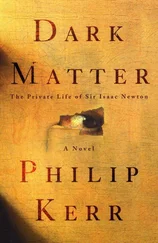Philip Kerr - A Man Without Breath
Здесь есть возможность читать онлайн «Philip Kerr - A Man Without Breath» весь текст электронной книги совершенно бесплатно (целиком полную версию без сокращений). В некоторых случаях можно слушать аудио, скачать через торрент в формате fb2 и присутствует краткое содержание. Год выпуска: 2013, Издательство: Quercus, Жанр: Триллер, на английском языке. Описание произведения, (предисловие) а так же отзывы посетителей доступны на портале библиотеки ЛибКат.
- Название:A Man Without Breath
- Автор:
- Издательство:Quercus
- Жанр:
- Год:2013
- ISBN:нет данных
- Рейтинг книги:4 / 5. Голосов: 1
-
Избранное:Добавить в избранное
- Отзывы:
-
Ваша оценка:
- 80
- 1
- 2
- 3
- 4
- 5
A Man Without Breath: краткое содержание, описание и аннотация
Предлагаем к чтению аннотацию, описание, краткое содержание или предисловие (зависит от того, что написал сам автор книги «A Man Without Breath»). Если вы не нашли необходимую информацию о книге — напишите в комментариях, мы постараемся отыскать её.
A Man Without Breath — читать онлайн бесплатно полную книгу (весь текст) целиком
Ниже представлен текст книги, разбитый по страницам. Система сохранения места последней прочитанной страницы, позволяет с удобством читать онлайн бесплатно книгу «A Man Without Breath», без необходимости каждый раз заново искать на чём Вы остановились. Поставьте закладку, и сможете в любой момент перейти на страницу, на которой закончили чтение.
Интервал:
Закладка:
The War Crimes Bureau was part of the Wehrmacht legal department’s international section, whose chief was the ailing Maximilian Wagner. Reporting to him was my boss, Judge Johannes Goldsche. He had headed the bureau from its inception in 1939. He was about sixty, with fair hair and a small moustache, a hooked nose, largish ears, a forehead as high as the roof on the flower house, and an Olympian disdain for the Nazis that stemmed from many years in private practice as a lawyer and judge during the Weimar Republic. His appointment to the bureau owed nothing to his politics and everything to his previous experience of war-crimes investigations, having been deputy director of a similar Prussian bureau during the Great War.
By state law the Wehrmacht was not supposed to be interested in politics, and it took this independence very seriously indeed. In the Wehrmacht’s legal office none of the six jurists charged with the regulation of the various military services were Party members. This is why – although I was not a lawyer – I fitted in very well. I think Goldsche regarded a Berlin detective as a useful blunt object in an arsenal that was filled with more subtle weapons, and he frequently used me to investigate cases where a more robust method of inquiry was required than just the taking of depositions. Few of the judges who worked for the bureau were capable of treating the shirking pigs and lying Fritzes that made up the modern German army – especially the ones who had committed war crimes themselves – as roughly as they sometimes deserved.
What none of these invariably Prussian judges perceived was that there were benefits that attached to being a witness in a war-crimes inquiry: a leave of absence from active service being the main one. As much as possible, we tried to interview men in the field, but it wasn’t every judge who wanted to spend days travelling to the Russian front, and one or two of the younger judges who did – Karl Hofmann for one – found themselves posted to active service. Those who had tried the experience were very nervous about flying to the front and, it’s fair to say, so was I. There are better ways to spend your day than bouncing around inside the freezing fuselage of an iron Annie in winter. Even Hermann Goring preferred the train. But the train was slow and coal shortages often meant that locomotives were stranded for hours – often days – on end. If you were a judge with the bureau, the best thing was to avoid the front altogether, to stay warm at home in Berlin and send someone else to the field – someone like me.
When I arrived at my desk I found a handwritten note summoning me to Goldsche’s office, so I took off my coat and belts, grabbed a notebook and a pencil, and went down to the second floor. It was a lot colder there, on account of the fact that several of the windows had been blown out by the recent bombing and were being replaced by some whistling Russians – part of a POW battalion of glaziers, carpenters and roofers that had come into being in order to make up for the shortage of German workmen. The Russians seemed happy enough. Replacing windows was a better job than disposing of unexploded RAF bombs. And probably anything was better than the Russian front, especially if you were a Russian, where their casualty rate was ten times worse than ours. Unfortunately that didn’t look like it was going to stop them from winning.
I knocked on Goldsche’s door and then entered to find him sitting by the fire wreathed like Zeus in a cloud of pipe smoke, drinking coffee – it must have been his birthday – and facing a thin, bespectacled, almost delicate man of about forty, who had a face as long and pale as a rasher of streaky bacon, and about as devoid of expression. Like most of the men I saw at the bureau, neither of them looked as if he belonged in uniform. I’d seen more convincing soldiers inside a toy box. I didn’t feel particularly comfortable wearing a uniform myself, especially as mine had a little black SD triangle on the left sleeve. (That was another reason Goldsche liked me working there; being SD gave me a certain clout in the field that wasn’t available to the army.) But their lack of obvious martial aptitude was more easily explained than my own: as civil servants within the armed forces, men like Goldsche and his unknown colleague had administrative or legal titles but not ranks, and wore uniforms with distinctive silver braid shoulder-boards to denote their special status as non-military soldiers. It was all very confusing, although I dare say it was much more confusing to people in the OKW how an SD officer like me came to be working for the bureau, and sometimes the SD triangle earned me some suspicious looks in the canteen. But I was used to feeling out of place in Nazi Germany. Besides, Johannes Goldsche knew very well I wasn’t a Party member – that, as a member of Kripo, I hadn’t had much choice in the matter of my uniform – and this was really all that mattered in the old Prussian’s republican book; this and the fact that I disliked the Nazis almost as much as he did.
I came to attention beside Goldsche’s chair and glanced over the pictures on the wall while I waited for the judge to address me. Goldsche was a keen musician, and in most of the pictures he was part of a piano trio that included a famous German actor called Otto Gebuhr. I hadn’t heard the trio play but I had seen Gebuhr’s performance as Frederick the Great in more films than seemed altogether necessary. The judge had music on the radio, although that was nothing to do with his love of music: he always turned on the radio when he wanted to have a private conversation, just in case anyone from the Research Office – which remained under Goring’s control – was eavesdropping.
‘Hans, this is the fellow I was telling you about,’ said Goldsche. ‘Captain Bernhard Gunther, formerly a commissar with Kripo at the Police Praesidium on Alexanderplatz, and now attached to the bureau.’
I clicked my heels, like a good Prussian, and the man waved a silent greeting with his cigarette holder.
‘Gunther, this is Military Court Official von Dohnanyi, formerly of the Reich Ministry of Justice and the Imperial Court, but these days he’s deputy head of the Abwehr’s central section.’
All of which meant of course that the special shoulder-boards and distinctive collar patches and civil servant titles were really quite unnecessary. Von Dohnanyi was a baron, and in the OKW this was the only kind of rank that ever really mattered.
‘Please to meet you, Gunther.’ Dohnanyi was softly spoken like a lot of Berlin lawyers, although perhaps not as slippery as some I’d known. I figured him for one of those lawyers who were more interested in making law than in using it to turn a quick mark.
‘Don’t be fooled by that witchcraft badge he’s wearing on his sleeve,’ added Goldsche. ‘Gunther was a loyal servant of the republic for many years. And a damn good policeman. For a while he was quite a thorn in the side of our new masters, weren’t you, Gunther?’
‘That’s not for me to say. But I’ll take the compliment.’ I glanced at the silver tray on the table between them. ‘And some of that coffee, perhaps.’
Goldsche grinned. ‘Of course. Please. Sit down.’
I sat down and Goldsche helped me to some coffee.
‘I don’t know where the Putzer got this,’ said Goldsche, ‘but it’s actually very good. As a lawyer I should probably have my suspicions about his being a blackie.’
‘Yes, you probably should,’ I remarked. The coffee was delicious. ‘At two hundred marks for a half-kilo that’s quite an orderly you have there. I’d hang on to him if I were you and learn to look the other way like everyone else does in this city.’
‘Oh dear.’ Von Dohnanyi smiled very faintly. ‘I suppose I should confess that the coffee came from me,’ he said. ‘My father gets it whenever he plays a concert in Budapest or Vienna. I was going to mention it before, but I hardly wanted to diminish your good opinion of the Putzer , Johannes. Now it seems I might get him into trouble. The coffee was a gift from me.’
Читать дальшеИнтервал:
Закладка:
Похожие книги на «A Man Without Breath»
Представляем Вашему вниманию похожие книги на «A Man Without Breath» списком для выбора. Мы отобрали схожую по названию и смыслу литературу в надежде предоставить читателям больше вариантов отыскать новые, интересные, ещё непрочитанные произведения.
Обсуждение, отзывы о книге «A Man Without Breath» и просто собственные мнения читателей. Оставьте ваши комментарии, напишите, что Вы думаете о произведении, его смысле или главных героях. Укажите что конкретно понравилось, а что нет, и почему Вы так считаете.












